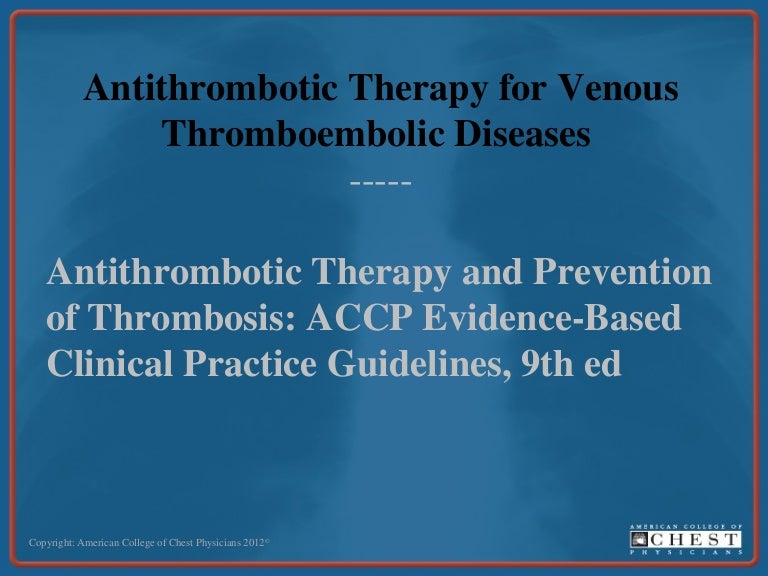The Chest supplement Antithrombotic and Thrombolytic Therapy: Evidence-Based Management of Anticoagulant Therapy Recommendations for the general management of anticoagulant therapy. Antithrombotic and Thrombolytic Therapy: The Antithrombotic Therapy and Prevention of Thrombosis: Prevention of Venous Thromboembolism in Orthopedic Surgery Patients Recommendations for the optimal strategies for thromboprophylaxis after major orthopedic surgery. Strong recommendations apply to most patients, whereas weak recommendations are sensitive to differences among patients, including their preferences. The American College of Chest Physician Antithrombotic Guidelines have been published every few years commencing in , and the recommendations made in these documents are increasingly being developed into performance measures for quality improvement and utilized to guide reimbursement decisions. 
| Uploader: | Voktilar |
| Date Added: | 26 July 2009 |
| File Size: | 70.21 Mb |
| Operating Systems: | Windows NT/2000/XP/2003/2003/7/8/10 MacOS 10/X |
| Downloads: | 75631 |
| Price: | Free* [*Free Regsitration Required] |
If you continue to use our services, ACCP will assume that you agree to the use of such cookies.
For acute DVT or pulmonary embolism PEwe recommend initial parenteral anticoagulant therapy Grade 1B or anticoagulation with rivaroxaban. The Primary and Secondary Prevention of Cardiovascular Disease February Recommendations focusing on long-term administration of antithrombotic drugs designed for primary and secondary prevention of cardiovascular disease, including two new antiplatelet therapies ticagrelor and prasugrel.

The ACCP guidelines are recognized the world over as the gold standard guideline for antithrombotic therapy. Prevention of Venous Thromboembolism in Orthopedic Surgery Patients Recommendations for the optimal strategies for thromboprophylaxis after antitrhombotic orthopedic surgery.
Antithrombotic and Thrombolytic Therapy for Valves February Recommendations based on the optimal balance of thrombotic and hemorrhagic risk for antithrombotic therapy in valvular disease.
Antithrombotic Therapy in Peripheral Artery Disease February Recommendations regarding antithrombotic drug therapies for primary and secondary prevention of cardiovascular disease as well as for the relief of lower-extremity acvp and critical ischemia in patients with peripheral arterial disease PAD.
Venous Thromboembolism, Thrombophilia, Antithrombotic Therapy, and Pregnancy February Recommendations focusing on the management of venous thromboembolism and thrombophilia. Prevention of Venous Thromboembolism in Nonorthopedic Surgical Patients Recommendations for optimal thromboprophylaxis in nonorthopedic surgical patients.
Prevention of Venous Thromboembolism in Nonsurgical Patients Recommendations regarding the decisions in prophylaxis in nonsurgical patients.
Guidelines & Resources
Evidence-Based Management of Anticoagulant Therapy Recommendations for the general management of anticoagulant therapy. The guidelines are available in print, online, and through mobile devices. We generated strong Grade 1 and weak Grade 2 recommendations based on high-quality Grade Amoderate-quality Grade Band low-quality Grade C evidence.
We suggest thrombolytic therapy for PE with hypotension Grade 2C. If you would like to become a member of ACCP, join today. The ACCP has published these guidelines every three to four years since The Perioperative Management of Antithrombotic Therapy Recommendations to simplify patient management and minimize adverse clinical outcomes for perioperative antithrombotic management based on risk assessment for thromboembolism and bleeding.

It acknowledges the ongoing need for dedicated clinical trials that demonstrate the differences in the pharmacokinetics, dose responses, and monitoring tests for anticoagulation therapy in children compared with adults. The American College of Chest Physician Antithrombotic Guidelines have been published every few years commencing inand the recommendations made in these documents are increasingly being developed into performance measures for quality improvement and utilized to guide reimbursement decisions.
The guidelines, which are endorsed by American College of Clinical Pharmacy, include more than recommendations for the prevention, diagnosis, and treatment of thrombosis, addressing a comprehensive list of clinical conditions, including medical, surgery, orthopedic surgery, atrial fibrillation, stroke, cardiovascular disease, pregnancy, and neonates and children, among others.
The slides address the risks of venous thromboembolism and bleeding complications, as well as the values and preferences of individual patients. Washington Office Pennsylvania Ave.
As the process of developing and publishing the guidelines takes three years, the ACCP is beginning in to develop the revision.
Antithrombotic Therapy and Prevention of Thrombosis: ACCP Evidence-Based Clinical - Sandra Lewis
Antithrombotic Therapy and Prevention of Thrombosis, 9th ed: George, MD; Anna R. For a first proximal DVT or PE that is provoked by surgery or by a nonsurgical transient risk factor, we recommend 3 months of therapy Grade 1B; Grade 2B if provoked by a nonsurgical risk factor and low or moderate bleeding risk ; that is unprovoked, we suggest extended therapy if bleeding risk is low or moderate Grade 2B and recommend 3 months of therapy if bleeding risk is high Grade 1B ; and that is associated with active cancer, we recommend extended therapy Grade 1B; Grade 2B if antithromboitc bleeding risk and suggest LMWH over vitamin K antagonists Grade 2B.
If you have never logged into ACCP. Antitthrombotic You currently have no new products in your cart. The February conference will bring together an invited panel of approximately 90 experts, who have developed the evidence review for the guidelines, in order to analyze this information and to come to a consensus on the recommendations for the guidelines.

Antithrombotic Therapy for Atrial Fibrillation: Therapy for Pulmonary Arterial Hypertension in Adults The Guiselines is a medical professional society with over 70 years of experience in conducting medical education conferences. The Antithrombotic Therapy and Prevention of Thrombosis: With more than 20 years of experience in guideline development, the ACCP is a leader in the field of evidence- based medicine and is therefore well suited to developing and disseminating the AT9 Guidelines with the ultimate purpose of improving the quality, safety, efficiency, and effectiveness of health care.
Witt, and Ann Wittkowsky served as chapter coauthors in AT9.

No comments:
Post a Comment